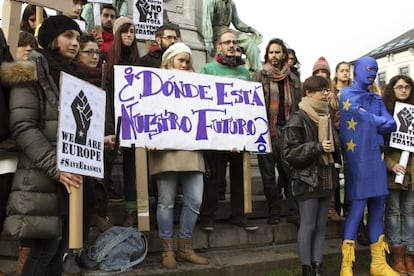Length of Erasmus stays to be reduced by half after budget cut
Time Spanish exchange students spend abroad will drop from eight to less than five months

In the next academic year 40,000 Spanish students will participate in the Erasmus European exchange program, the same number as this year. But most of them will be studying abroad for half the time as those currently enjoying the benefits of the scheme, staying for just one semester instead of two.
Spain’s Education Ministry has decided to reduce the length of stays so that its cuts to the program’s funding will not leave anyone without a grant. This year, the budget will be 18 million euros, compared with the 34 million set aside for 2013-14. The amount contributed by Brussels will increase by 4.3 percent (2.2 million euros) to 53.4 million. In total there is 23.8 million less for next year.
Controversy over Erasmus grants erupted in November when students found out they would no longer be receiving their grant halfway through the year, pitting the government against Brussels, as Spain’s center-right Popular Party government insinuated that there was also going to be a reduction in the money arriving from Europe. This was the reason, the government said, that they were losing 20,000 grants.
The ministry will give students the chance to stay “one or two months more”
According to data from the Autonomous Organization for European Educational Programs (OAPEE), in 2010-11 the average stay for those on the Erasmus study program – not the vocational training program – was six months as a whole and 7.5 months in the case of Spaniards. The next year it went up to eight months for Spain. “Almost all participants were abroad for the whole year, those who only went for a semester were in the minority,” says former OAPEE director Emilio García Prieto. “What lowers the average a bit more is higher vocational training – less than 10 percent of grant recipients – which consists of placements of two or three months.
“Our students do not have a good level of foreign languages and when they start to get going is when they will have to come back,” he says.
The secretary of state for education, Montserrat Gomendio, on Tuesday argued that the ministry had wanted to prioritize “flexibility with Bologna academic organization,” referring to the process to standardize higher education across Europe. It believes that the “logical thing is align with the other countries” as the European average is a one-semester stay.
The ministry will give students the chance to stay “one or two months more” if it is justifiable academically and, in such cases, the grant will run at the cost of the universities, which this year will hand out 12 million euros, 5.6 million more than last year.
Students will receive an average of 250 euros per month - compared with the current 215 euros - adding together the grants from the ministry and Brussels, with the recipients of a general grant getting an average of 350 euros (this year they received 348 euros). Those studying in countries with a low cost of living will receive 200 euros and those traveling to more expensive destinations, such as Scandinavia, will get 300 euros.
Students from the Canaries will receive grants of between 650 to 750 euros because of their more isolated position.
Tu suscripción se está usando en otro dispositivo
¿Quieres añadir otro usuario a tu suscripción?
Si continúas leyendo en este dispositivo, no se podrá leer en el otro.
FlechaTu suscripción se está usando en otro dispositivo y solo puedes acceder a EL PAÍS desde un dispositivo a la vez.
Si quieres compartir tu cuenta, cambia tu suscripción a la modalidad Premium, así podrás añadir otro usuario. Cada uno accederá con su propia cuenta de email, lo que os permitirá personalizar vuestra experiencia en EL PAÍS.
¿Tienes una suscripción de empresa? Accede aquí para contratar más cuentas.
En el caso de no saber quién está usando tu cuenta, te recomendamos cambiar tu contraseña aquí.
Si decides continuar compartiendo tu cuenta, este mensaje se mostrará en tu dispositivo y en el de la otra persona que está usando tu cuenta de forma indefinida, afectando a tu experiencia de lectura. Puedes consultar aquí los términos y condiciones de la suscripción digital.









































